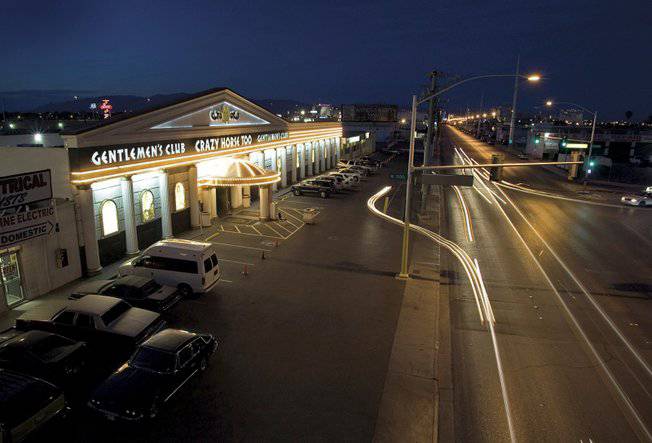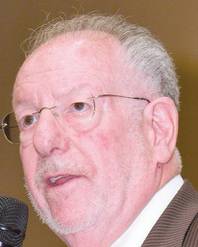
Steve Marcus / File photo
The Crazy Horse Too strip club on Industrial Road is shown in September 2007.
Friday, Sept. 25, 2009 | 2 a.m.

Oscar Goodman
Sun Archives
- Court overturns $2.2 million fine against Vegas strip club (3-13-2009)
- Subpoena of Rizzolo sparks buzz of speculation (2-23-2009)
- Vegas to host trial in case about drugs, guns, terror (2-6-2009)
- Second Crazy Horse Too operator in IRS hot water? (1-22-2009)
- U.S. government angling to join skin industry — briefly, reluctantly
- Feds seek license to operate topless bar (10-31-2008)
- Bank seeks to foreclose on club, leaving others owed with zilch (10-21-2008)
- Judge rules against federal government in Crazy Horse Too case (6-26-2008)
The federal government has wanted to unload the Crazy Horse Too strip club ever since the U.S. Marshals Service assumed ownership of it in 2007 as part of a plea agreement with its former owner, felon Rick Rizzolo.
After two years and at least one failed attempt, the marshals finally have an agreement in place with a new potential buyer, Mayor Oscar Goodman and several attorneys close to the case confirmed this week.
Pete Rinato, a local attorney for the prospective buyer, said the buyer signed a contract with the Marshals Service about three weeks ago. He declined to name his client, who he said is a “non-local,” but added that his name would be released soon.
In a larger sense, an alliance of sorts has been formed, said several attorneys knowledgeable about the deal, a kind of “strange bedfellows” pact in which many of the normally adversarial parties are now allied because they’re eager for the sale to go through.
Those parties include the prospective buyer, the federal government, Rizzolo and the man who successfully sued the now-shuttered club after his neck was broken there. This alliance doesn’t yet include the city, though it might before all is said and done.
The agreement hinges on the owner of a Russell Road strip club, calling itself the Crazy Horse 3, giving up that name so future owners of the Crazy Horse Too, on Industrial Road, can retain sole rights to the name.
The pact is also relying on the city to grant a liquor license and exotic dance permit to the club’s buyer, so the value of the club can be boosted. Without a liquor license, the club is valued at about $5 million — far less than it would be with the proper licenses. As of 15 months ago, with the licenses, the club was valued at $32 million.
Rinato said a lawsuit will soon be filed, possibly as soon as this morning, against the owners of the Crazy Horse 3, demanding that they give up that name.
After serving roughly 10 months in federal prison for tax evasion, Rizzolo was released in early 2008. As part of his guilty plea, Rizzolo was allowed to use proceeds from the sale of the gentleman’s club to satisfy tens of millions of dollars in debts he owes various parties.
According to previous accounts, Rizzolo owes:
• $7 million in fines and forfeitures to the federal government;
• $9 million to a Missouri man, Kirk Henry, who got into a fight at the club in 2001 and suffered a broken neck;
• $5 million to a California bank that loaned Rizzolo the money months before his plea deal with the feds;
• $1.6 million to $2 million in fines the city levied against the club.
Goodman said he didn’t know who the potential buyer is, and hasn’t asked. Others who do know, including federal officials, aren’t talking.
“We are unable to discuss our specific strategy and efforts to sell the property at this time since the sale of the Crazy Horse Too is an ongoing matter,” said Dave Turner, a Marshals Service spokesman in Washington, D.C.
Mark Hafer, Rizzolo’s attorney, said Rizzolo has always been optimistic the Marshals Service would be able to sell the property. “He’s hoping that the marshals and the City Council together can work out a sale. He hopes his creditors can get paid in full,” he said.
The City Council addressed the matter in June 2008, when it was weighing whether to extend Crazy Horse Too’s tavern license. Two South Carolina businessmen, David Dupont and Mahesh Patel, with the marshals’ backing, wanted to purchase the club for $32 million. But an attorney for the businessmen said lenders were “queasy” about backing a multimillion-dollar loan for a club that was closed and lacked the needed licenses.
Moreover, Goodman and the council were skittish about granting the liquor license at that time, in effect saying the city would not put itself at risk by reopening a club with a checkered past and with potential new owners who had not been fully vetted.
The fact that a number of worthy parties were eager to get paid wasn’t enough for Goodman, who complained about being left out of the negotiations.
“We were omitted from the settlement process initially,” a steamed Goodman said at the council’s June 18, 2008, meeting. “The council was never consulted. We weren’t briefed. There was no request of us as to what our attitude or opinion would be as far as future licensing is concerned.”
The council unanimously voted down the tavern license application.
The feds apparently learned their lesson and are keeping city officials abreast of developments this time around.
Two top lawyers retained by the marshals last week visited city officials. Chris Kaempfer and Tom Amick met with Goodman and Mayor Pro Tem Gary Reese to lobby on behalf of the Marshals Service, according to city lobbyist registration forms.
On Thursday, Goodman confirmed that the marshals want the city to cooperate in granting a tavern license and exotic dancing permit so a sale can go through.
“They wanted to know what the city would do as far as licensing them, assuming that the buyer was clean as ivory snow,” Goodman said. “I told them my position, which is very clear: I’m interested in the money that they owe us on the fine. Show me the money and I’m happy to talk.”
Goodman said he isn’t demanding that the marshals pay the city upfront. But he said Las Vegas is far down on the list of creditors drawn up by U.S. District Court Judge Philip Pro. For years, each of the parties has pushed and prodded Pro to do what he can to help force a sale of the club.
Goodman said the city needs somehow to be moved up the list of court-approved creditors to ensure it would actually get paid if and when a sale goes through.
“They’re going to have to readjust that order for me to get interested,” Goodman said.
It’s unclear whether Judge Pro would alter the list, or whether it could be circumvented by agreements between the parties.
Federal agents seized the Crazy Horse Too in September 2007. The following June, Pro criticized the marshals for not applying for a city liquor license and simply taking over the club.
At the time, the marshals said they didn’t want to run a strip club. Three months later they changed their tune, recognizing that they needed the licenses to get a higher sale price.
Neither Kaempfer nor Amick returned calls for comment. Henry’s Las Vegas attorneys, Don Campbell and Jack DeGree, also could not be reached.

Join the Discussion:
Check this out for a full explanation of our conversion to the LiveFyre commenting system and instructions on how to sign up for an account.
Full comments policy